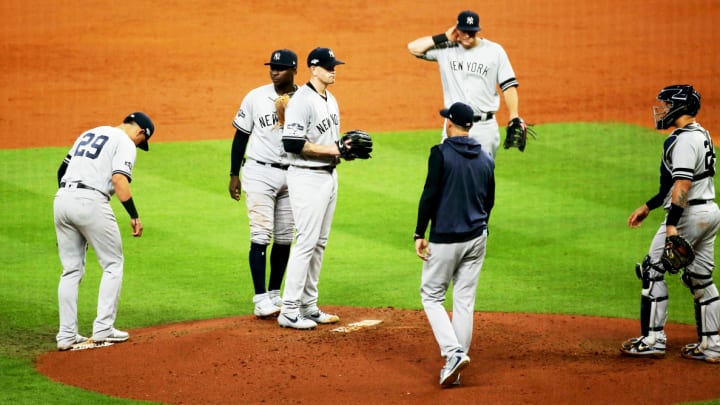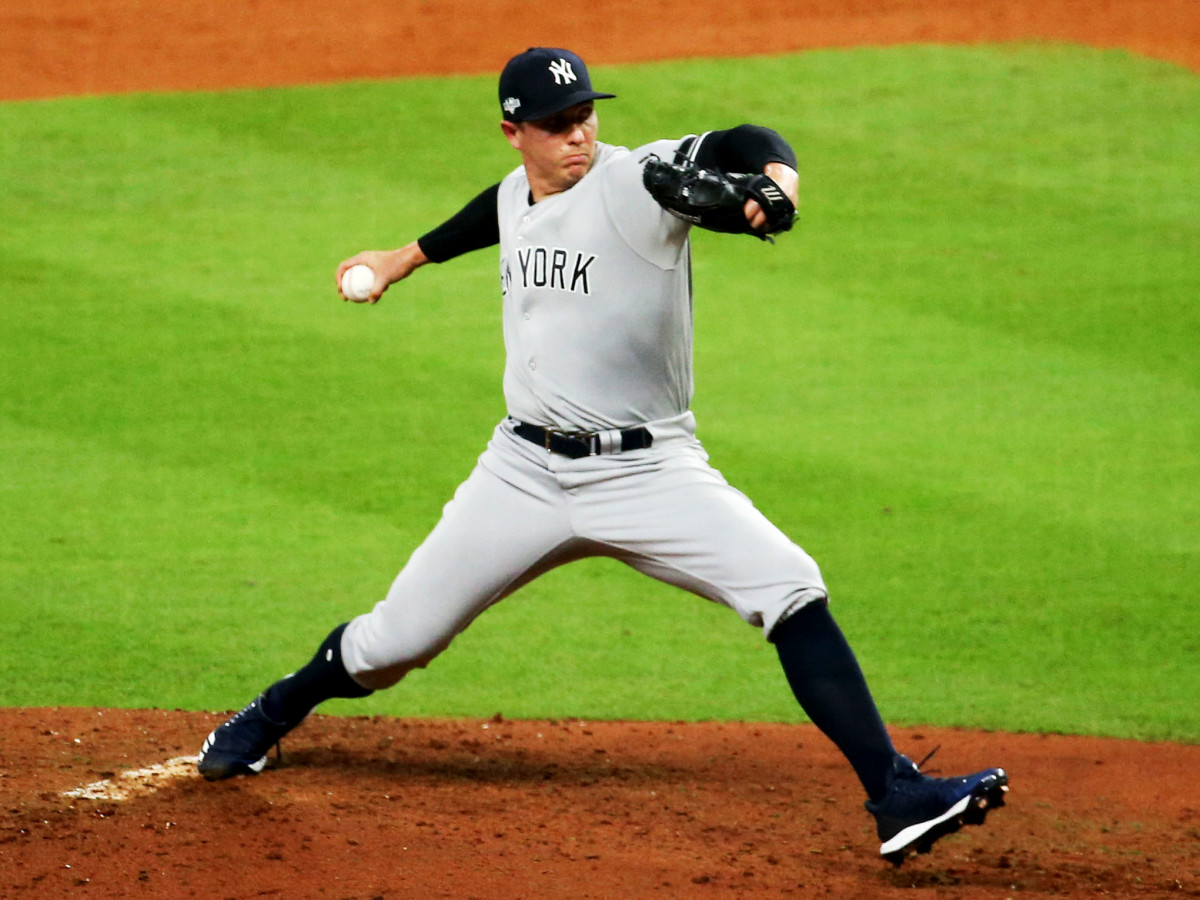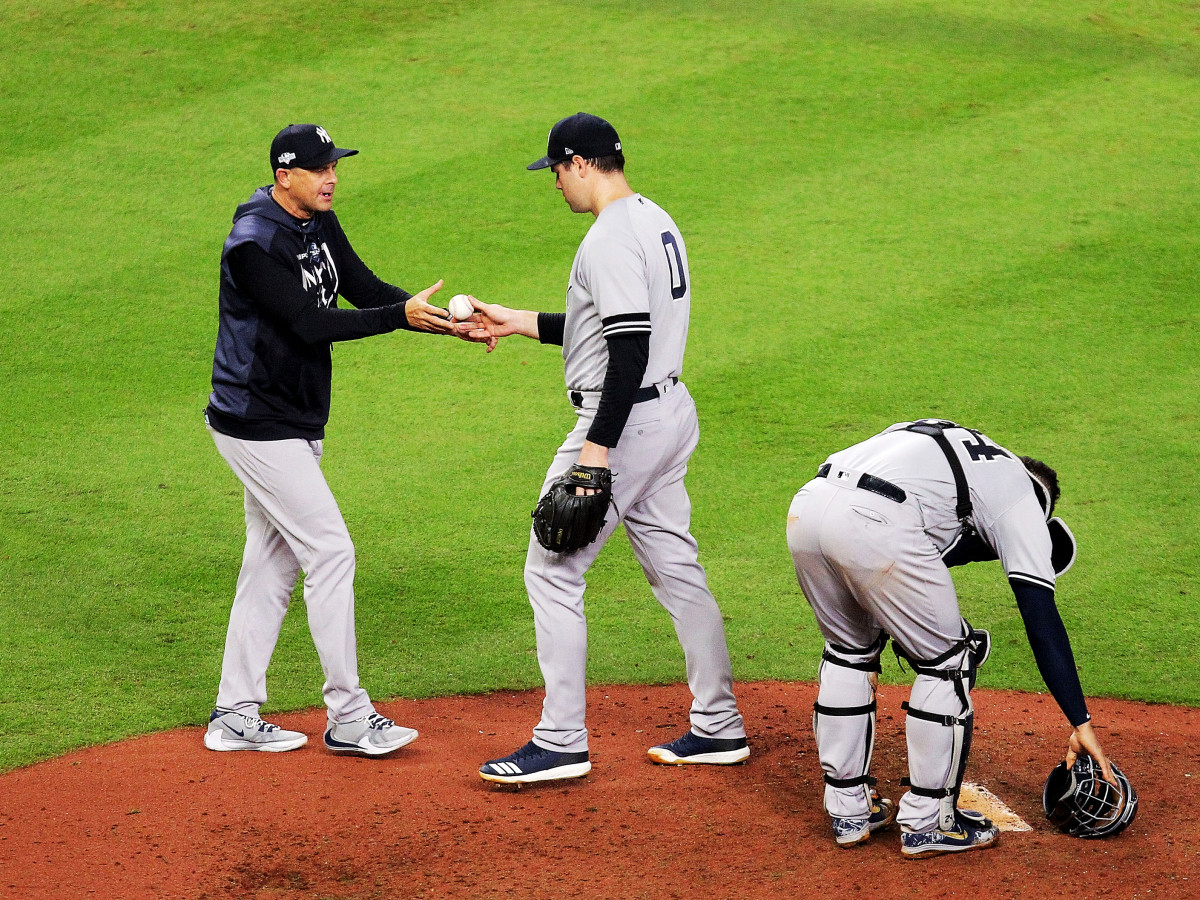Inside the Surprising Pitching Change That Cost Aaron Boone and the Yankees


HOUSTON — Managers matter more than ever in the postseason, which seems counterintuitive if you think the subtleties of the game are being sanded away by power. Teams have stolen just 20 bases in 24 games this postseason. There have been six sacrifice hits, none yet in the American League. Funeral services are being held next month for the hit and run play. The Yankees and Astros played a stretch of 118 minutes in Game 2 of the American League Championship Series Sunday night without a single hit—a run of 36 consecutive batters.
The game today isn’t any better or worse than what it was; it’s just different. The game always evolves. It’s less of an aficionado’s game, which theoretically opens it up to a broader audience.
But New York manager Aaron Boone, and to a much lesser degree his counterpart, Houston manager A.J. Hinch, proved games can be won and lost on manager’s decisions. Baseball is more about a parade of relievers than it’s ever been, which places an inordinate amount of pressure on a manager when it comes to influencing the outcome of the game.
Sunday night Boone made eight pitching changes, and one helped cost him the game.
And it is not the one you thought.
Asked about pulling starter James Paxton in the third inning of a 1-0 game, Boone replied, “You're playing it to win the game. You're not playing it to—what if we go 13, you know? You're playing it to what gives us the best chance to win here. And the bottom line is we end up giving up a third run in the 11th inning. I'd say from a run prevention standpoint it went pretty well.”
The move made perfect sense. I liked the aggressiveness. Boone saw the game in the balance: Paxton, with what was squirrelly fastball command, facing Alex Bregman with two runners on, one out and Justin Verlander having mowed down each of the first nine hitters he faced. Plain and simple, Paxton doesn’t get the high-leverage at-bat.
Asked what he thought when he saw Boone walk to the mound, Paxton said, “ ‘Crap.’ You never want to come out of a game, but this is the postseason and things are done differently. He has his reasons. I respect that.”
Boone left 20 outs for his bullpen to get. No reason to get in a snit about it. Guess what: he had 10 pitchers in the bullpen. He had a day off Monday. His top relievers were not stressed the previous day. They had played four games in the previous 13 games.
Translation: he was loaded to the gills to ride the deepest bullpen in baseball to the finish line while waiting for his offense to percolate. And it did, when Verlander walked a leadoff man for only the eighth time all year—and only the fourth time he walked anybody after getting ahead 0-and-2. The walk to DJ LeMahieu put Verlander in the stretch for the first time. And upon his second pitch, with his rhythm disrupted, Verlander yielded a homer to Aaron Judge.
Now Boone needed 18 outs to take a 2-0 lead in the series, a brutal situation for the Astros.

Chad Green looked as if he could pitch all night, mowing through the Houston hitters without the least bit of stress. He threw 26 pitches to get out six batters—21 pitches for strikes.
But then Boone turned the lead over to Adam Ottavino, and this is where Game 2 went down the trash chute for the Yankees. A cascade of mistakes resulted in Springer whacking a first-pitch slider for a game-tying homer. Carlos Correa would win it in the 11th with a leadoff homer off J.A. Happ, the 15th pitcher of the night.
Mistake No. 1: Boone decided after the fourth inning that Ottavino would pitch to Springer.
Asked when he was told he was coming in, Ottavino confirmed, “When the previous inning ended. They told me I had the second hitter [Springer].”
It didn’t matter that Green blew away Kyle Tucker (a curious pinch-hit choice by Hinch because Tucker can’t hit a high fastball, which is Green’s best pitch.)
Boone was sticking to a script. He didn’t trust what he was seeing with Green, who 23 times this year threw more than 26 pitches. There was no room for editing the script, not even when Green was throwing aspirin tablets for fastballs.
Postseason #SpringerDinger No. 12 gives George the most in @astros history. pic.twitter.com/dtahffBrkt
— MLB Stats (@MLBStats) October 14, 2019
Mistake No. 2: Ottavino had faced Springer 24 hours earlier. He threw him a slider, his best pitch, in Game 1, although that one doesn’t go in the scrapbook collection of his best sliders. Springer hit a rocket to centerfield for an out at 103.9 m.p.h.
“He hit a slider [in Game 1],” Ottavino said. “Obviously the more exposure a hitter gets against a pitcher in a series the more it helps the hitter.”
Springer was 0-for-4 with three strikeouts against Ottavino in his career. That by itself is meaningless. As Hinch said, his analytics department believes you need to see about 30 matchups between a pitcher and hitter to put confidence behind it.
Mistake No. 3: Springer is a notorious first-pitch hitter. He also was the best hitter against breaking pitches in the league (.323). Ottavino is a breaking ball pitcher. Springer had seen and smashed Ottavino’s slider the night before.
“I knew he was probably looking breaking ball first pitch,” Ottavino said. “We had a one-run lead, nobody on base and I was just trying to get ahead. I have a lot of confidence in the slider, obviously. I wanted it down and away. I was going to err on the side of throwing a strike.”
Mistake No. 4 (and this is really the only one that matters): Ottavino threw a really bad slider. He hung a first-pitch slider to a great breaking ball hitter sitting on the pitch. Goodbye.
“I was expecting a swing,” he said. “It just came out early [from the hand]. Not ideal.”

Getting off Paxton so quickly didn’t cost Boone the game. He didn’t trust the Paxton-on-Bregman matchup with runners on, and that’s defensible. (Though you wonder about Paxton’s confidence the next time Boone gives him the ball.)
“Just felt like we were covered as far as today with getting some length and having guys rested,” he said. “Obviously going into an off day tomorrow we're just going to be aggressive. Thought he was struggling with his command. And it ends up—doesn't end well.”
Good for Boone that he took note of Paxton’s command issues in weighing what to do. But when it came to trusting the command issues of Green (very good), he went strictly by the script. And now he must wonder if Ottavino is still allowed in the bullpen circle of trust. Ottavino has allowed 13 baserunners in six career postseason innings.
“It’s the first home run I’ve given up to a righthanded hitter all year on a slider,” he said.
He is correct. Ottavino had thrown 399 sliders to righthanded hitters, held them to a ridiculous .124 batting average and did not allow a home run. Those are the kind of numbers that made Boone’s sticking-to-the-script so appealing.
But the 400th slider cost the Yankees dearly, and proved that postseason baseball doesn’t need bunts and stolen bases to be an excruciating decision tree for managers.
